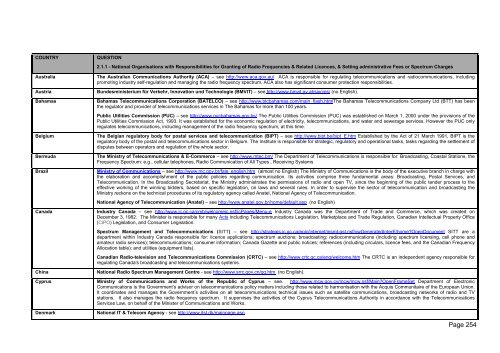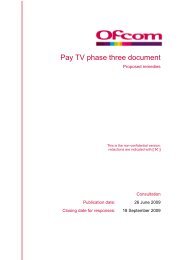FINAL REPORT - Stakeholders - Ofcom
FINAL REPORT - Stakeholders - Ofcom
FINAL REPORT - Stakeholders - Ofcom
Create successful ePaper yourself
Turn your PDF publications into a flip-book with our unique Google optimized e-Paper software.
COUNTRY<br />
QUESTION<br />
2.1.1 - National Organisations with Responsibilities for Granting of Radio Frequencies & Related Licences, & Setting administrative Fees or Spectrum Charges<br />
Australia The Australian Communications Authority (ACA) – see http://www.aca.gov.au/ ACA is responsible for regulating telecommunications and radiocommunications, including<br />
promoting industry self-regulation and managing the radio frequency spectrum. ACA also has significant consumer protection responsibilities.<br />
Austria Bundesministerium für Verkehr, Innovation und Technologie (BMVIT) – see http://www.bmvit.gv.at/sixcms/ (no English).<br />
Bahamas Bahamas Telecommunications Corporation (BATELCO) – see http://www.btcbahamas.com/main_flash.htmlThe Bahamas Telecommunications Company Ltd (BTT) has been<br />
the regulator and provider of telecommunications services in The Bahamas for more than 100 years.<br />
Public Utilities Commission (PUC) – see http://www.pucbahamas.gov.bs/ The Public Utilities Commission (PUC) was established on March 1, 2000 under the provisions of the<br />
Public Utilities Commission Act, 1993. It was established for the economic regulation of electricity, telecommunications, and water and sewerage services. However the PUC only<br />
regulates telecommunications, including management of the radio frequency spectrum, at this time.<br />
Belgium The Belgian regulatory body for postal services and telecommunication (BIPT) – see http://www.bipt.be/bipt_E.htm Established by the Act of 21 March 1991, BIPT is the<br />
regulatory body of the postal and telecommunications sector in Belgium. The Institute is responsible for strategic, regulatory and operational tasks, tasks regarding the settlement of<br />
disputes between operators and regulation of the whole sector.<br />
Bermuda The Ministry of Telecommunications & E-Commerce – see http://www.mtec.bm/ The Department of Telecommunications is responsible for: Broadcasting, Coastal Stations, the<br />
Frequency Spectrum: e.g., cellular telephones, Radio Communication of All Types , Receiving Systems<br />
Brazil Ministry of Communications – see http://www.mc.gov.br/fale_english.htm (almost no English) The Ministry of Communications is the body of the executive branch in charge with<br />
the elaboration and accomplishment of the public policies regarding communication. Its activities comprise three fundamental areas: Broadcasting, Postal Services, and<br />
Telecommunication. In the Broadcasting Secretariat, the Ministry administrates the permissions of radio and open TV, since the beginning of the public tender process to the<br />
effective working of the winning bidders, based on specific legislation, on laws and several rules. In order to supervise the sector of telecommunication and broadcasting the<br />
Ministry reckons on the technical procedures of its regulatory agency called Anatel, National Agency of Telecommunication.<br />
National Agency of Telecommunication (Anatel) – see http://www.anatel.gov.br/home/default.asp (no English)<br />
Canada Industry Canada – see http://www.ic.gc.ca/cmb/welcomeic.nsf/icPages/Menu-e Industry Canada was the Department of Trade and Commerce, which was created on<br />
December 3, 1982. The Minister is responsible for many Acts including Telecommunications Legislation, Marketplace and Trade Regulation, Canadian Intellectual Property Office<br />
(CIPO) Legislation, and Consumer Legislation.<br />
Spectrum Management and Telecommunications (SITT) – see http://strategis.ic.gc.ca/epic/internet/insmt-gst.nsf/vwGeneratedInterE/home?OpenDocument SITT are a<br />
department within Industry Canada responsible for: licence applications; spectrum auctions; broadcasting; radiocommunications (including spectrum licensing, cell phone and<br />
amateur radio services); telecommunications; consumer information; Canada Gazette and public notices; references (including circulars, licence fees, and the Canadian Frequency<br />
Allocation table); and utilities (equipment lists).<br />
Canadian Radio-television and Telecommunications Commission (CRTC) – see http://www.crtc.gc.ca/eng/welcome.htm The CRTC is an independent agency responsible for<br />
regulating Canada's broadcasting and telecommunications systems.<br />
China National Radio Spectrum Management Centre - see http://www.srrc.gov.cn/gg.htm (no English).<br />
Cyprus Ministry of Communications and Works of the Republic of Cyprus – see. http://www.mcw.gov.cy/mcw/mcw.nsf/Main?OpenFrameSet Department of Electronic<br />
Communications is the Government’s advisor on telecommunications policy matters including those related to harmonisation with the Acquis Communitaire of the European Union.<br />
It coordinates and manages the Government’s activities on all telecommunications technical issues such as satellite communications, broadcasting networks of radio and TV<br />
stations. It also manages the radio frequency spectrum. It supervises the activities of the Cyprus Telecommunications Authority in accordance with the Telecommunications<br />
Services Law, on behalf of the Minister of Communications and Works.<br />
Denmark National IT & Telecom Agency - see http://www.itst.dk/mainpage.asp<br />
Page 254
















